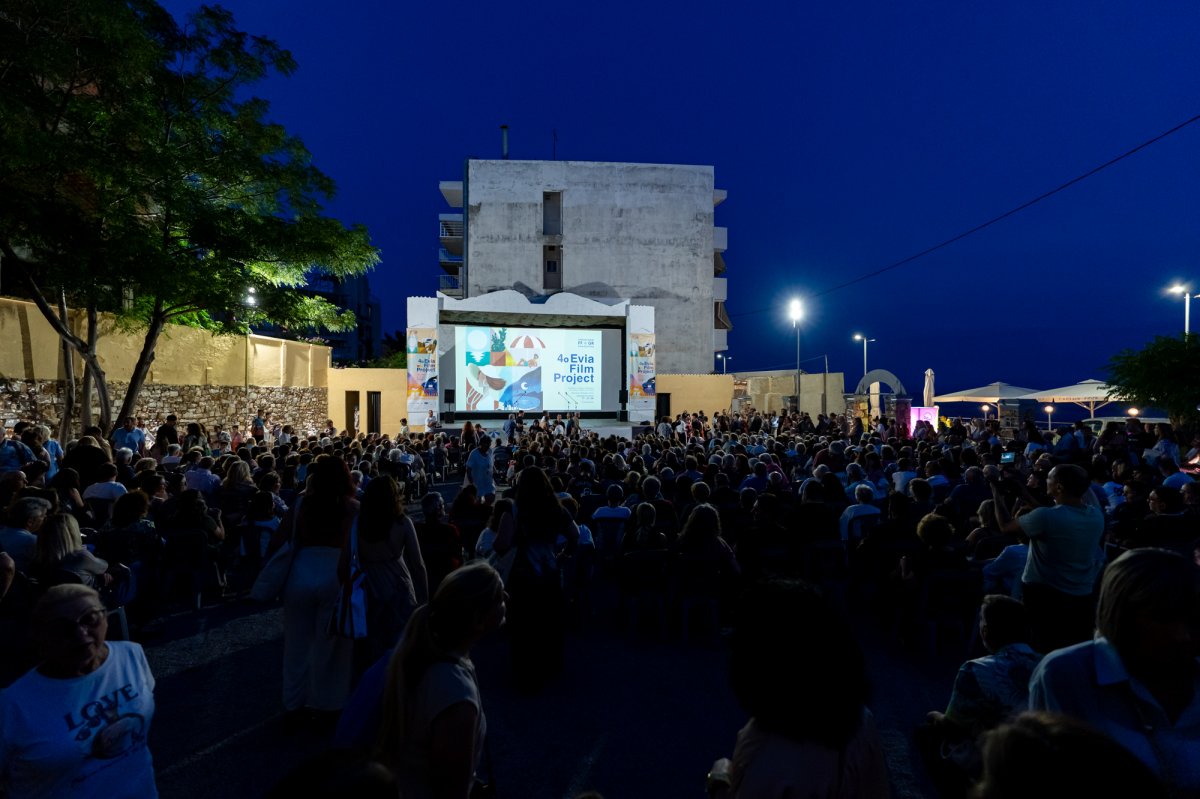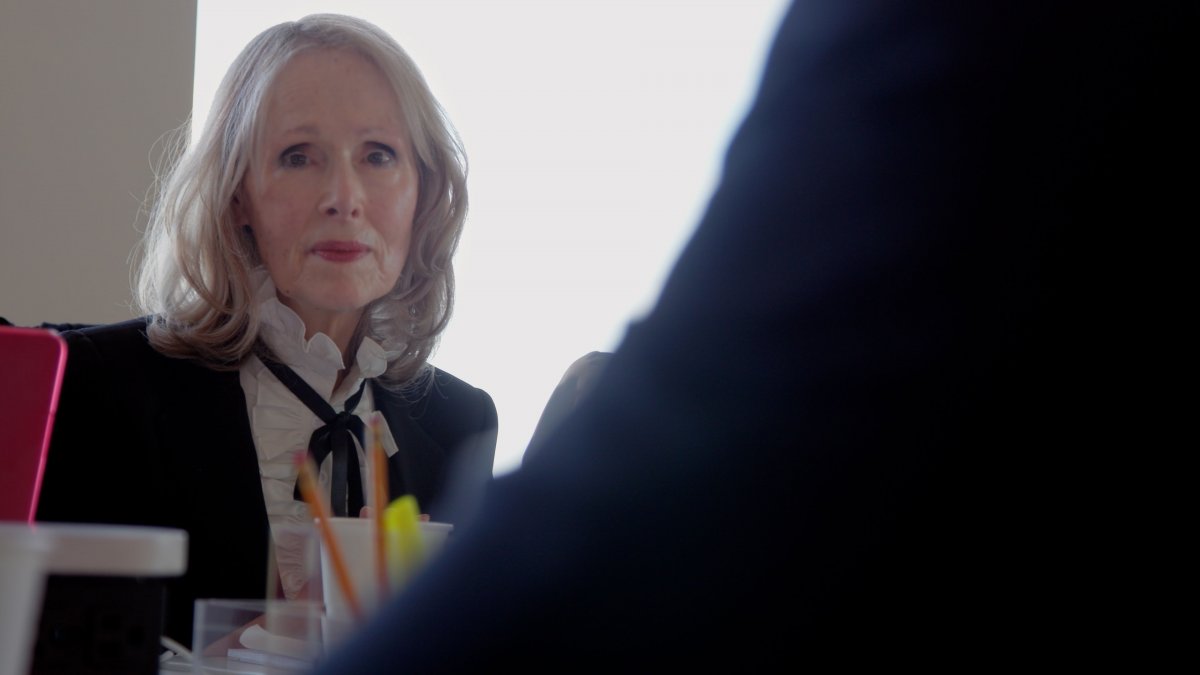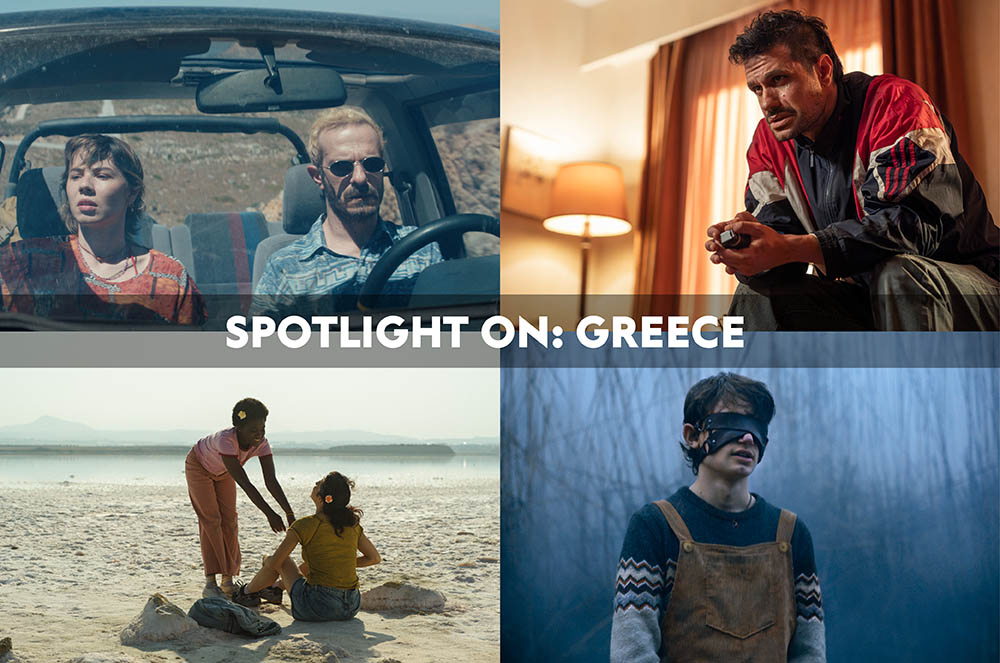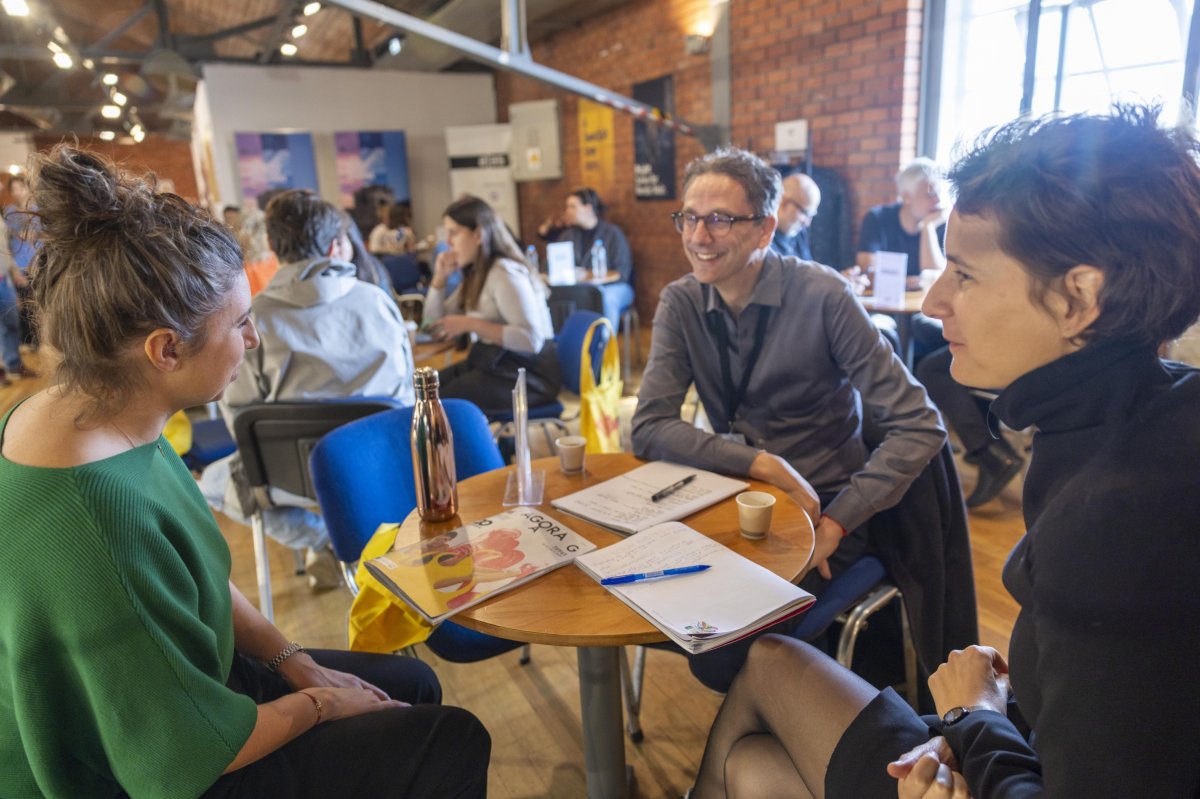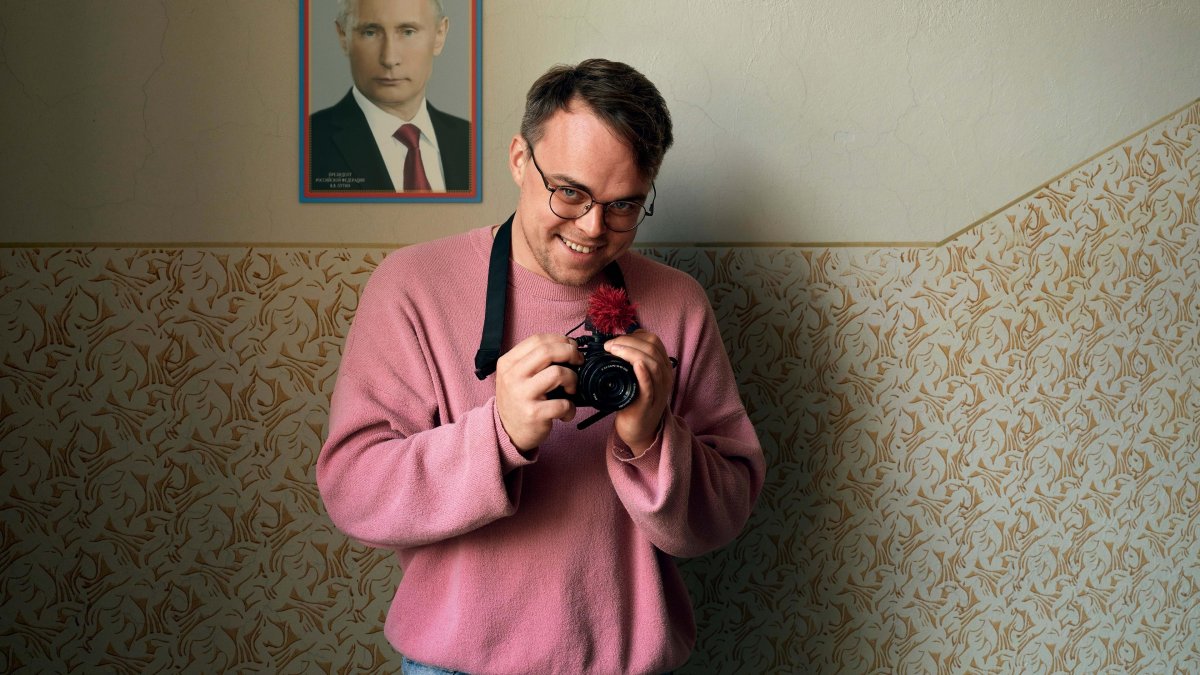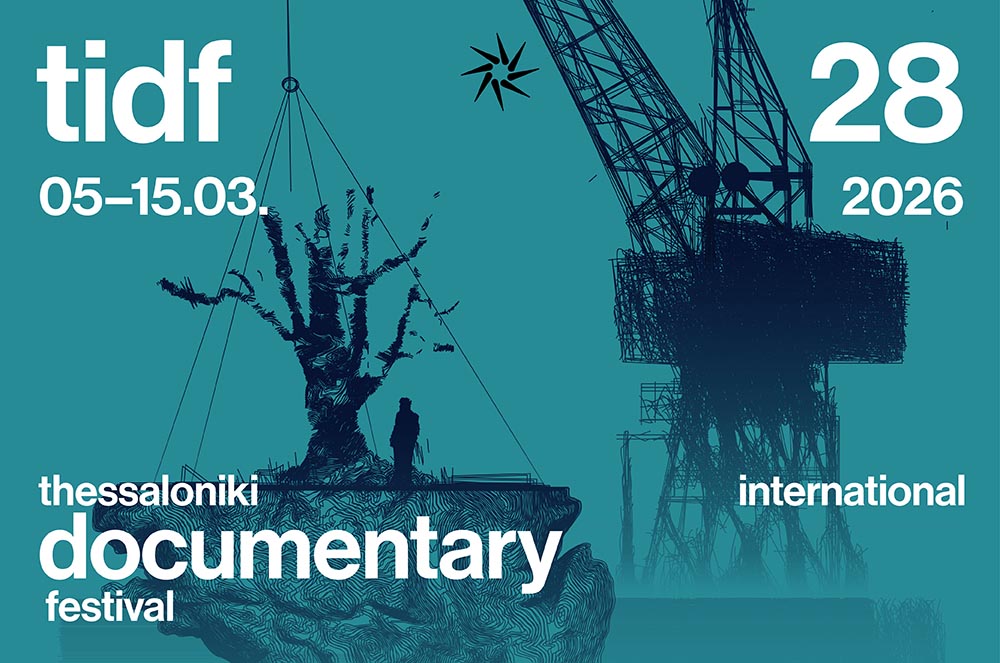With music, dance, and the screening of the smash hit Stelios by Yorgos Tsemberopoulos attended by members of the film’s cast and crew, at the packed open-air cinema “Apollon”, the 4th Evia Film Project, the Festival’s green initiative, carried out with the support of the Ministry of Culture, called it a wrap on Saturday June 21st, 2025. This year, the 4th EFP hosted a grand music feast for its closing, featuring a series of special events in Edipsos and Limni, celebrating in the best way the first day of summertime and Music Day. Moreover, the specialized educational program, held by the Evia Film Project and addressed to the students from the Department of Digital Arts & Cinema of the National & Kapodistrian University of Athens, based in Psachna, Evia, was also successfully concluded on Saturday with the masterclass delivered by Argyris Papadimitropoulos.
The closing ceremony was presented by the Festival’s General Director Elise Jalladeau and the Head of the Greek Program Eleni Androutsopoulou. “For yet another year, the Evia Film Project comes to an end. Ιt was a great start for this year's summer, here in Northern Evia. This year we are particularly happy, since we feel that the Evia Film Project was loved even more. The attendance of the local community, students and visitors in our screenings, workshops and parallel events was massive. Our collaboration with the local authorities and businesses was excellent. The way you welcomed us, really touched us. At the same time, the Festival’s guests from all over the world, more than 350, got to know and love this magical place and its people. Through a range of diverse actions in Edipsos, Limni and Agia Anna, we tried to discover the different sides of the Greek summer and to redefine our connection with it, at a time when everything is changing and we know we should change too. We enjoyed tastes, smells, sounds, and images of the Greek summer, on land and at sea, and today, the longest day of the year and European Music Day, we discovered different kinds of music from Greece, Europe and the world, in Edipsos and Limni. We would like to thank the Ministry of Culture for its constant support, the local authorities for the valuable collaboration, and the Festival’s sponsors and supporters that are always by our side. We would also like to thank our Evia partners and all the people working for our organisation that embraced the Evia Film Project for yet another year. Thanks to their professionalism, their enthusiasm and their creativity, Evia Film Project was a success.”
At this point, Eleni Androutsopoulou invited the Mayor of Istiaea-Edipsos Mr. Giannis Kontzias, who gave a brief greeting. “At first we said that the Evia Film Project is the most kind and thoughtful action of support the Greek state had targeted towards the tormented and fire-stricken Northern Evia. However, I think this year was way different than the previous ones. The Evia Film Project went through a coming-of-age, and started standing on its own feet more solidly. We have come to know each other better, and as a result we understand one another at just a glance. The success of this endeavor proves that the Evia Film Project has a bright future ahead. This year’s edition was by the far the most warmly received by the Evia audience, which wholeheartedly embraced this effort. Moreover, the Evia Film Project has begun to leave its mark in the field of the film industry professionals. This year, you left us thrilled and you carried us away, back to distant and tender times, and today you had Northern Evia pumped up through your music events. Having reached the curtain call of this year’s festival, the feeling that prevails for all of us who will stay here is a sweet sorrow, which nonetheless goes hand in hand with the hope of meeting again next year. Our dream is to have you by our side in the years to come, and that the Evia Film Project will declare each year the official opening of summertime in Northern Evia. Over the past few days, seeing so many film industry people here with us evoked the glorious days of Edipsos’ own belle époque, when Charlie Chaplin, Greta Garbo and many more cinema stars were a part of the town’s summer,” concluded Giannis Kontzias.
Elise Jalladeau went on to invite the President of the Festival’s Board of Directors Akis Sakellariou on stage, who spoke with most heartfelt words about Northern Evia and the Evia Film Project, while conveying a message from Stelios Angeloudis, the Mayor of Thessaloniki, the city which has been the home ground of the Festival for the past 66 years. “The Mayor of Thessaloniki addresses a warm greeting and reaffirms his support to the Festival, by sending out the following message: ‘We proceed guided by a vision, while developing joint actions and synergies’,” mentioned Akis Sakellariou, before congratulating the Festival’s staff and the residents of Edipsos, Limni and Agia Anna “for the big hug they gave us. I would also like to personally thank the Mayor of Istiaea-Edipsos Giannis Kontzias. We embarked on this journey four years ago, and I hope we will keep it alive next year, with even greater passion and zeal, more guests and actions.”
“Today it’s the European Music Day, so we chose to call it a wrap for the 4th Evia Film Project with a screening of a film that has been loved as few by the audience. A film dedicated to the life and work of the legendary Greek artist Stelios Kazantzidis, who sang his way to the hearts of all of us: the film Stelios,” said Eleni Androutsopoulou. She then called on stage many of the people that made this film happen: scriptwriter and Vice-President of the Festival’s Board of Directors Katerina Bei, producer Dionysis Samiotis, Executive Director of Corporate Communications, Sustainability Growth and CEO Cosmote TV Production Dimitris Michalakis, and beloved film director and close of friend of the Festival Yorgos Tsemberopoulos, whom she thanked for granting the film for the closing screening of the 4th Evia Film Project.
Yorgos Tsemberopoulos was the first to take the floor. “I would like to thank all my friends from Northern Evia, who have joined us tonight from the nearby villages, and of course the audience of Edipsos; I make sure to stress that enough because filmmakers are like a kind of errants: We go from festival to festival, taking a seat to watch the films directed by fellow directors. Being here in the death-stricken Northern Evia and seeing you filling up the open-air cinemas means a great deal to all of us. Films need to be watched for the first time on the big screen. The small screen is for reruns,” said Yorgos Tsemberopoulos.
Coming right up, Eleni Androutsopoulou asked Dionysis Samiotis and Dimitris Michalakis how the first spark for producing a film on Stelios Kazantzidis was ignited. Dionysis Samiotis went on to say: “We thank you all for being here today. This film sprang out of an idea and the support of Dimitris Melissanidis. We all served this vision in the best possible way, in an effort that blended in with our goal: To bring Greek culture and history to the audience through films, but also bring the audience closer to Greek cinema. All of our films, Eftihia, Smyrna, Murderess, and now Stelios, prove our point. Thank you for supporting our vision and for giving us the strength to carry on,” mentioned Dionysis Samiotis.
Dimitris Michalakis then took the floor, and added that: “To tell you the truth, when Dionysis came to COSMOTE TV to discuss the project, there was no real need for any intense pitching, as we considered it as the next link to a chain of preexisting projects. After so many collaborations, we had reached a point of maturity. We wanted to work together and foreground stories like this one, while reaching out to a younger audience. We believe we have pulled that one off, especially thanks to our outstanding casting. We are so excited that the film was so enthusiastically received, and we can’t wait for our next steps to come,” concluded Dimitris Michalakis.
At that point, the baton was passed on the film’s scriptwriter and Vice-President of the Festival’s Board of Directors Katerina Bei, who laid down the difficulties she was faced up against while writing a script for such an iconic personality. “Thank you all for being here and for having embraced this festival that keeps getting better, with a bigger attendance and even higher spirits. As for the script, let me just say that the greatest challenge was no other than Stelios Kazantzidis himself, his character, his flair, his imprint on people. Judging in the comfort of the final outcome, anyone could say that a film on Kazantzidis is bound to become a hit. It’s not quite like that, though, as we had to attract to types of audiences that were poles apart. Firstly, the audience that had lived his myth first-hand and thought of him as an untouchable figure, and audience sceptical of any casting choice as they believed that no-one could be compared with him. Secondly, the contemporary audience, which was unaware of Kazantzidis’ stature, as they had got to know him only through some interviews on YouTube, and considered him to be a controversial and confrontational figure, even dislikable to some. So, we needed to come up with a getaway to both these contradicting audiences. It was no easy work to outline a hero with defects and flaws, who pulled off a series of remarkable achievements and was loved as no other in his times, while also succeeding to reach out to a younger audience.”
Finally, when asked on the way Stelios Kazantzidis’ personality has been portrayed in the film, director Yorgos Tsemberopoulos noted: “Stelios is not just the fruit of our work and of the crew's work. It was born out of all those who wrote these magnificent songs. In the movie you are about to watch, you will get carried away by the talent of lyricists and composers who have created masterpieces that have lasted 50-60 years and are destined to last even more. People who could communicate with the audience just with a handful of words; and this film proves that they still do. Today’s songs have a life cycle of one or two years after their release. The longevity of old songs is acknowledged by the audience, and in Greece we can be proud of a decades-long tradition. Before the film begins, I would like to say that tonight “Apollon” has just been equipped with a balcony and a box as you have literally packed it,” finalized Yorgos Tsemberopoulos. The screening of the film Stelios, the biggest Greek box-office hit, came up next, celebrating its premiere in the island of Evia. A party inspired by the closing film’s music wrapped the event at Kyma.
Μusic events
The Evia Film Project celebrated the coming of summer along with the Music Day, setting up music surprises at the most unexpected venues and places, ranging from traditional folk and éntekhno all the way to rebetiko, jazz and pop. The audience of Northern Evia was given the chance to get carried away by the magic of music, taking delight in music ensembles and bands of all sorts: In Edipsos – at Kyma, the Thermopotamos Square, the Park, Kalyva and Pontios taverns – and in Limni – at the Mela Building, the Lela Karagianni statue, the Wooden Pier, Platanos tavern, Baroūs Café – among others. All events had free admission for the public.
The all-day music celebration was concluded with the live concert of the acclaimed singer Eleni Arapoglou, who performed covers of famous Greek summer songs at Kyma, followed by a traditional “patinada” (street serenade) by the top-notch percussion and brass band Agia Fanfara, in a one-of-a-kind street party at the streets of Edipsos that made it all the way to the open-air cinema “Apollon”, just prior to the screening of the film Stelios. The band performed beloved traditional and contemporary melodies from Greece, the Balkans and the wider Eastern Mediterranean, pumping up the audience of Northern Evia.
Masterclass by Argyris Papadimitropoulos
In Agia Anna, film director Argyris Papadimitropoulos (Suntan) delivered a fascinating masterclass to the students from the Department of Digital Arts & Cinema of the National & Kapodistrian University of Athens, based in Psachna, Evia.
He described his working method as “punk rock”, pointing out that what interests him the most is for things to be spontaneous, and not worked out beforehand up to the last detail. Nevertheless, he clarified that certain pillars within the film need to work in perfection, so as to know where you’re standing and where you’re headed to. “Between these pillars you can set up an alphabet of your own. But if you know your departure point and your desired destination, you can’t get lost in-between, even if you resort to improvisation,” he mentioned.
Referring to a film’s journey, he stressed that its success should not be measured by whether it will be accepted to major film festivals or not. “It goes without saying that it’s wonderful to be recognized and accepted by a grand festival, but it’s not the only way to move forward,” he clarified. As for his personal journey, he commented: “I learnt along the way that I must not get stressed so much, some things are meant to happen, while some others not.” He also underlined that doing something you truly love, “it is bound to find its way, or maybe not, or maybe the world has too many film directors already, and you’ll end doing something else that’s equally nice, for example becoming a top-notch editor.” He also argued that no member of a film crew is unnecessary. As for the choice of partners, he explained that personality needs to be the guideline, and not just the talent or the showreel of a potential partner. “This is really important, and to find that out you need to have worked with different people first,and then decide who you prefer to team up with,” he added.
“Not taking a risk is the greatest risk of all. Try to make something following in the footsteps of others, and it’s almost a guaranteed failure, or simply a pathway that will lead you to something utterly mediocre. If that suits you well, do it, copycat someone else and try to swim in the same waters. But I promise you it won’t be any fun, there’s no way in hell that you will enjoy it,” he said, before giving a valuable piece of advice to the students: “You have chosen a film school, so you have already taken a risk. You have not chosen a field of studies that will make you sought-after out in the professional market. Therefore, your jumping-off point is precisely that risk. In the course of a film, right from the initial ideal and all the way to its screening, your heart gets crumbled upon and torn to pieces like a hundred times. You get stressed over everything, you are overcome by financial stress, creative stress, a ton of things will occur in the process. It’s a living hell unless you are in it for a serious reason. If you just do it for the sake of doing it, or if you do it in the same exact way someone else did it before you, there’s no point in going through all of this,” he completed.


